I feel bad for her because I can sympathize with her. I was the same way for a very long time before I learned just how difficult leading such a life can be. When we aren't willing to let other people do stuff for us, we overwhelm ourselves with tasks that we don't necessarily need to be doing. And when we're overwhelmed, we don't tend to do the tasks nearly as well as we could if we weren't doing too much. Our stress levels go up, the quality of our work goes down, and it's very difficult to find any sort of peace in our minds or spirits.
This friend wishes she didn't have so much to do. The truth is, though, that she doesn't have nearly as much to do as she thinks she does. It's the fact that she isn't willing to let go of results that keeps her working too hard and too intensely, and until she is finally ready to let go of results, she'll continue to sabotage her own happiness by keeping herself too busy. Sometimes I like to let other people do things even if I'm pretty sure that they'll make mistakes doing them--then I get a bit of rest, and they get a wonderful learning experience through their mistakes. Both of us win, then, and there are almost no jobs or tasks that have to be done absolutely perfectly, ever. When we can let go of that need for perfection, then we can finally go about the business of living our lives, peacefully and easily.
Letting go doesn't mean we don't care. Letting go doesn't mean
we shut down. Letting go means we stop trying to force outcomes
and make people behave. It means we give up resistance to the way
things are, for the moment. It means we stop trying to do the
impossible--controlling that which we cannot--and instead, focus on
what is possible--which usually means taking care of ourselves.
And we do this in gentleness, kindness, and love, as much as possible.
Melody Beattie
we shut down. Letting go means we stop trying to force outcomes
and make people behave. It means we give up resistance to the way
things are, for the moment. It means we stop trying to do the
impossible--controlling that which we cannot--and instead, focus on
what is possible--which usually means taking care of ourselves.
And we do this in gentleness, kindness, and love, as much as possible.
Melody Beattie







